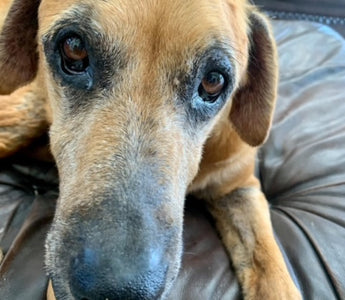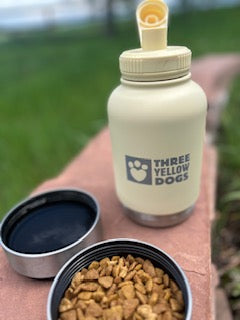I don't know about you all, but my head feels so stuffy right now. It’s like I’m underwater, with itchy eyes and barely able to breathe. Yep, it's allergy season again. Every year around this time, my allergies flare up. As I sit here suffering, I can't help but think about my boy, Winston.
Winston, a Labrador Retriever mix, also had severe allergies. He had all the symptoms: constant itching, licking, chewing, inflamed skin, hair loss, frequent ear infections (which I believe contributed to his hearing loss), and bowel issues. Poor Winston was a total mess! His allergies affected his life and our entire family’s life as well. It was frustrating and absolutely heartbreaking.
We of course took him to the vet multiple times, we tried everything to give him relief—topicals, medications, immunotherapy—you name it, we tried it.We spent thousands of dollars, but nothing worked. Finally they did a full blood workup to identify the causes. It turned out that Winston had severe environmental allergies. The vet confirmed that Winston was in fact allergic to Florida.
At that time, my family and I were splitting our time between Florida and Colorado. While we were in Colorado, Winston was happy and healthy, with no allergies at all. But as soon as we returned to Florida, his allergies would flare up again within weeks, bringing back the itchy skin, ear infections, and all the other symptoms. Eventually, we were able to move to Colorado full-time, and finally, Winston was free from his allergy symptoms. Though he never liked walking on the grass after all that, he was happy.
I’m sharing Winston’s story because I want you to know I’ve experienced having a dog with allergies firsthand. I know how awful it is and how helpless you can feel. In this blog, we'll delve into the world of dog allergies, exploring their causes, symptoms, and ways to alleviate their discomfort. Get your pen and paper ready, you might want to take some notes. 😁
Understanding Dog Allergies:
Similar to humans, dogs can be allergic to a variety of substances, including pollen, dust mites, certain foods, and even fleas. These allergies occur when a dog's immune system overreacts to a normally harmless substance, triggering a range of uncomfortable symptoms.
Common Allergens:
Top allergens include food, the environment, flea saliva and medications.
- Pollen: Just like us, dogs can suffer from seasonal allergies caused by pollen from grasses, trees, and weeds. Spring and fall are particularly challenging seasons for dogs with pollen allergies.
- Dust Mites: These microscopic critters can thrive in our homes, especially in bedding, carpets, and upholstery, triggering allergic reactions in sensitive dogs.
- Foods: Certain ingredients in your dog's food, such as beef, chicken, dairy, or grains, can lead to allergic reactions, manifesting as itching, gastrointestinal upset, or even skin infections.
- Fleas: Flea saliva is a common allergen for dogs, causing intense itching and discomfort. Even a single flea bite can trigger an allergic reaction in sensitive dogs.
- Certain medications can also cause an allergic reaction. If you notice any of the following symptoms please consult your vet asap.
Symptoms of Dog Allergies:
- Persistent itching, licking, or chewing, especially around the paws, face, groin, or base of the tail.
- Red, inflamed skin, often accompanied by hot spots or hair loss.
- Chronic ear infections, indicated by redness, discharge, or foul odor.
- Sneezing, coughing, or wheezing, particularly in response to specific environmental triggers like pollen.
- Gastrointestinal issues, such as vomiting or diarrhea, in the case of food allergies.
Diagnosis and Treatment:
If you suspect your dog has allergies, it's essential to consult with your veterinarian for proper diagnosis and treatment. Your vet may perform various tests, including skin or blood tests, to identify specific allergens. Once the allergens are identified, treatment options may include:
- Avoidance: Whenever possible, avoid exposing your dog to known allergens. This may involve keeping your home clean and free of dust mites, using flea preventatives, or switching to hypoallergenic foods.
- Medications: Your vet may prescribe antihistamines, corticosteroids, or other medications to alleviate your dog's symptoms and reduce inflammation. There are some over the counter medications that can work but it depends on the severity of the symptoms. As always please check with your veterinarian. Some popular over-the- counter medications may include; Diphenhydramine (Benadryl®), cetirizine (Zyrtec®), and loratadine (Claritin®). Apaquel and Temaril are most commonly prescribed by a veterinarian.
- Immunotherapy: In severe cases, your vet may recommend allergen-specific immunotherapy (allergy shots) to desensitize your dog's immune system to specific allergens over time.
- Topicals: Topical treatments will provide temporary relief, giving your pet a break from all that scratching. This one was huge for us. We personally try to go a more homeopathic route. We would often bathe Winston in coconut oil and use apple cider vinegar. Local honey is also a great way to support your dog. Remember everything in moderation. Slow and steady wins the race.
Supporting Your Allergic Dog:
Beyond medical treatment, there are several ways you can support your allergic dog:
- Maintain a clean living environment by regularly vacuuming, washing bedding, and minimizing exposure to environmental allergens.
- Feed your dog a high-quality, hypoallergenic diet tailored to their specific dietary needs.
- Provide regular grooming to keep your dog's coat clean and free of allergens, and consider using hypoallergenic grooming products. We personally used a lot of pure coconut oil. We thought it was excellent and as Winston licked it, it would work internally as well as externally.
- A strong immune system is very important. Keep your dog's immune system strong with regular exercise, a balanced diet, and appropriate veterinary care.
- Invest your time and figure out what allergens are affecting your dog. This may require some detective work, but it is well worth it.
There's a wealth of information on dog allergies, and this is just the beginning. I’ll dive deeper in a future blog post, but I hope this overview has provided some helpful insights and recommendations. Remember, you’re not alone in this battle.
In the end it took us moving across the country to give Winston the proper relief that he needed. I know that sounds discouraging, but the point I’m trying to get across is that you need to fight for your dog. Don’t be afraid to try homeopathic treatments, trust your gut and listen to your dog. I promised Winston I would fight for him, and I extend that promise to all of you. Together, we can make a difference.
If you have any questions please email me at amy@threeyellowdogs.com I would be happy to help you.
Thank you for your time, we appreciate you. ❤️🐾
https://www.axios.com/2024/04/01/pet-dog-allergies-skin-problems
https://www.cabbagetownpetclinic.com/blog/june-2022/skin-allergies-in-dogs
https://urgentvet.com/allergies-in-dogs-symptoms-treatment/
https://vcahospitals.com/know-your-pet/allergy-general-in-dogs
https://vcahospitals.com/know-your-pet/are-over-the-counter-medications-safe-for-my-dog













